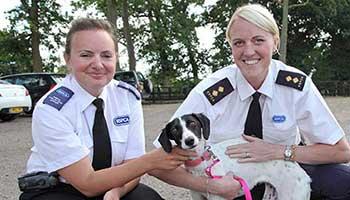Almost HALF of adults in England unaware of cat microchipping laws
08.06.23
The RSPCA has issued an urgent reminder to pet owners in England that they will soon be breaking the law if their cats aren’t microchipped - with nearly half unaware that they could soon fall foul of the law.
As of 10 June 2024 failing to have your cat microchipped could result in a hefty fine.
The animal welfare charity’s warning comes following the results of a survey they conducted at the end of last month. Data showed that almost half (47%) of adults in England were not aware of the new cat microchipping law.
In addition to this, the RSPCA has reported that 83% of cats brought into its animal centres across England and Wales in 2022 were not microchipped.
Under the new legislation, which was announced in March this year, from 10 June 2024 it will be a legal requirement to microchip pet cats after they reach 20 weeks of age. Owners will also be required to keep their contact details up-to-date on a pet microchipping database.
Owners found not to have microchipped their cat will have 21 days to get one implanted or may face a fine of up to £500.
Samantha Watson, scientific officer and cat welfare expert at the RSPCA said: “The countdown is truly on to get your cats microchipped and steer clear of those hefty fines. This month is also National Microchipping Month, so what better time to get your cat chipped and make sure your friends and family are aware of the incoming law too.
“Microchipping is an absolutely essential component of being a responsible pet owner. This new law means that lost cats can be easily identified and reunited with their owners, rather than being handed to rehoming charities who are struggling with overflowing waiting lists.
“Microchipping dogs has been mandatory for many years, so to finally see the same law and protections being applied to cats is a huge step forward for feline welfare.
“We have seen countless stories of non-microchipped cats that have been hit by a car or strayed who never get reunited with their owner, as well as the happy stories where cats have been reunited with their owners by our dedicated RSPCA officers thanks to this tiny chip. We feel positive that - thanks to the change in the law - now we will see many more happy stories than sad ones.
“We are hopeful that alongside increasing the number of lost or injured cats reunited with their owners, the new law will help to tackle other common welfare issues for cats, including abandonments.”
The RSPCA survey also found that there was overwhelming public support for the new microchipping laws, with over three-quarters of adults in England agreeing that this is a positive development for cat welfare.
Samantha added: “Microchipping is a very easy and painless procedure which involves a tiny microchip being quickly and simply inserted under the animal’s skin and this then gives the pet their own unique code.
“The microchip can be scanned and matched to the owner’s contact details which are kept on a database. We believe the optimum time to microchip a cat is when they are neutered as a kitten at around four-months-old and under anaesthetic.
“If an owner moves house or changes their telephone number they must also make sure that they tell the database they are registered with so that they have up-to-date contact details. If the information on that database is old and out-of-date then the chip is useless. Telling your vet does not automatically update the details on the database but this is something you can do yourself online.”
Whilst the RSPCA is thrilled to see cat microchipping laws being introduced in England, the charity is also hopeful that the Welsh Government will act and introduce compulsory microchipping for cats in Wales too.
“Seven in ten adults in Wales agree that mandatory microchipping would improve cat welfare in Wales.” Samantha continued.
“Which goes to show the public are heavily in favour of introducing microchipping laws, it’s just down to the Welsh government now to take action.”
Microchipping in England will not be compulsory for unowned or feral cats.
More information about cat microchipping can be found online.


